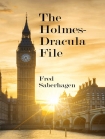The Dracula Tape, Fred Saberhagen [the dot read aloud TXT] 📗

- Author: Fred Saberhagen
Book online «The Dracula Tape, Fred Saberhagen [the dot read aloud TXT] 📗». Author Fred Saberhagen
In other ground-floor rooms the handful of other patients then in residence rocked ceaselessly upon their beds, or stared at their contorted fingers, or paced the floor. And from behind the half-closed blind of one such room came utterance in tones of such dismal, groaning sorrow that even I must draw near to see whose voice it was. I caught a glimpse of book shelves, paneled walls, and then …
It was Dr. Seward’s study, and in fact his voice, although it did not issue from his throat. Seated at a desk with her back to me was a sturdy, brown-haired young woman, her fingers poised above the keys of a strange machine that clacked rhythmically and printed words upon a sheet of paper that wound itself spasmodically through it on a roller. Upon the young woman’s curly head rested a device of forked metal whose cupped ends managed to embrace both her ears, and from these ear cups issued Seward’s voice — though of course I did not recognize it then — tuned to a groaning slowness that enabled the typist to keep up. From the headset a wire ran to a nearby table, where a cabinet contained a spring-driven mechanism that made things turn, and a needle rode lightly in the groove that wound about a waxen cylinder.
It was a simple type of early phonograph, of course — how far from that to this small wonder that I hold in my hand! — on which Seward was wont to keep his journal, which his new ally Mina had just volunteered to transcribe. I recognized her almost at first sight as Lucy’s friend, the girl who had come to lead Lucy home from the Whitby churchyard at midnight.
On Mina’s finger a wedding ring now gleamed, where none had been before; but I had no doubt of my identification. A female servant chanced to enter the room and Mina’s voice, coming out faintly through the leaded glass when she spoke briefly to the girl, was the same that had called out “Lucy! Lucy!” on Whitby’s tall cast cliff, that August night that already seemed so long ago.
The servant went out and a few moments later a stalwart man of about thirty entered. He had a rather stern, commanding look, though his voice when he spoke was mild enough: “And how is the work progressing?”
Mina’s machine ceased clacking and she removed her headset. “Slowly but surely, Dr. Seward.”
“I expect it will be a great help to have it all in typescript, Mrs. Harker.”
What Mina replied, I do not know. I sat there on the windowsill for a full two minutes, blinking my little bat eyes, stunned by the club of coincidence once again. When at last I rose and flew, I was already over the wall and into Carfax before I remembered that it could no longer offer me safety for my rest. I flew on to one of my new lairs, in Bermondsey, thankful that my plan of dispersing boxes was already so far advanced, and pondered what new snares Fate might have laid in my path. That Harker and his wife should now know Seward came as no surprise; but that the wife of the guest I left in Transylvania should chance to be the second girl I saw in England was a staggering concurrence of events.
Harker himself was at that time in Whitby, trying to pick up my trail there. He had been galvanized into becoming one of my most enthusiastic persecutors by his recent meeting with Van Helsing. As it turned out, however, there was not a great deal for him to learn in Whitby, beyond confirming that my boxes had been sent on to London; and on the next day, September thirtieth, Harker was back in Purfleet, at the asylum, where his wife was already established in guest quarters. They were joined there on the same day by Van Helsing, Arthur, and Quincey Morris.
When I came to reconnoiter the asylum again that night I at once perched on a high windowsill of Seward’s study; and it was with a sense of fortune at last deciding to smile upon me that I saw the blinds were partially open and a strategy meeting was in progress before my eyes.
There was Van Helsing at the head of a large table, with Mina, notebook open on her lap, sitting at his right hand as secretary. Her husband sat beside her, looking fully restored to health. Flanking Dr. Seward on the table’s other side were a tall young Englishman, obviously of the upper classes — this was Arthur, as I soon understood — and a fresh-faced young American, Quincey Morris, who sat closest to the table’s foot.
Van Helsing, as usual, was speaking whilst his disciples listened. Their expressions were varied, ranging from horror, through incredulity, to a sort of numbness that still was not exactly boredom; the subject matter of the address was of a kind to transcend deficiencies of treatment.
“He is of cunning more than mortal,” were the first words I heard as I began to eavesdrop. “For his cunning be the growth of ages; he have still the aids of necromancy … and all the dead that he can come nigh to are for him at command; he is brute, and more than brute … he can, within limitations, appear at will when and where, and in any of the forms that are to him; he can, within his range, direct the elements; the storm, the fog, the thunder; he can command all the meaner things; the rat, and the owl, and the bat — the moth, and the fox, and the wolf …”
Could I have commanded the pinworm and the body louse I would have sent a plague of them upon him. Apart from the superstitious rubbish about necromancy, though, he was doing a reasonably good job of describing the wanted man, of whose identity not one of his hearers was in doubt.





Comments (0)